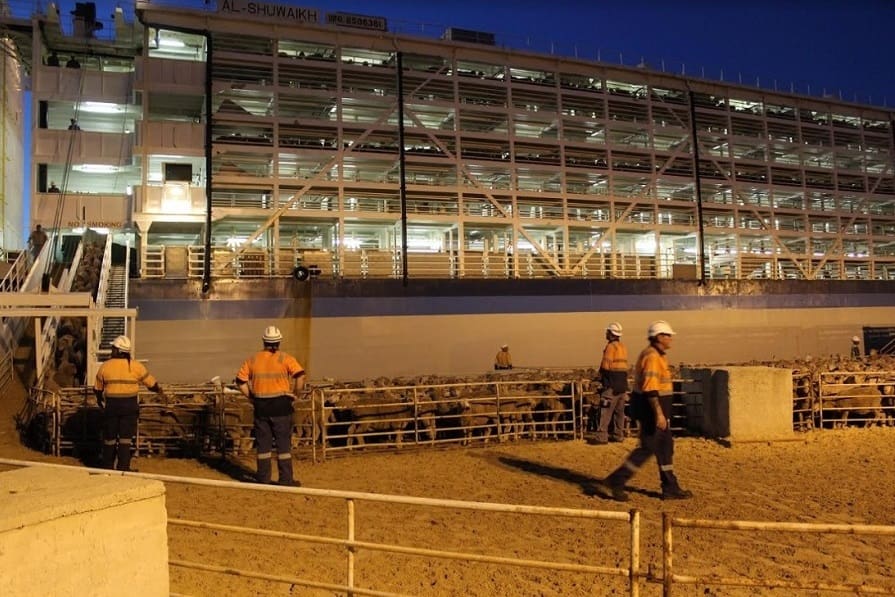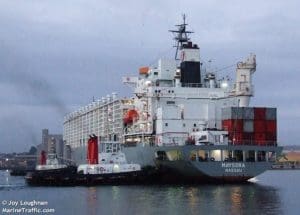
Sheep being loaded on the Al Shuwaikh at Adelaide last year.
LIVE sheep shipments to the Middle East from Western Australia will resume later this month after an extended trade moratorium amid increased concerns exporters are looking elsewhere for supplies.
The state’s sheep industry has been hit by news that a major Middle East sheep importer has re-directed a vessel to South Africa, despite suspension of the northern summer trade to the Middle East ending on September 22.
Sheep Central has been told that the Kuwait Livestock Transport and Trading vessel, Al Shuwaikh, is on its way to South Africa for sheep.
Another KLTT vessel, the Al Messilah, is due to load about 60,000 sheep and some cattle at Fremantle later this month for the Middle East, but the company has also been sourcing sheep out of Somalia and Romania to replace supply from Australia during the current trade suspension.
Last month, Australia’s live export regulator, the Department of Agriculture, extended its initial northern summer sheep trade suspension period of June 1-August 31 by three weeks to September 22, due to the risk of heat stress on sheep.
The moratorium followed the release of footage showing shipments in which thousands of sheep died due to overcrowding and sheep stress while en route to the Middle East, leading to a raft of industry and standards reviews that result in the cancellation of exporters’ licences, and reduced stocking rate and improved ventilation regulations.
Department could have allowed earlier shipments – Seabrook
However, the department rejected industry efforts to recommence earlier shipments to some Middle East destinations, that would have allowed loading from Western Australia earlier this month.
Pastoralists and Graziers Association president Tony Seabrook claimed the Department of Agriculture bureaucracy had seemed unwilling to engage with exporters to discuss differences between the Gulf and the Red Sea as destinations and it was short-sighted for Australia to lose live export markets to other countries.
It was his understanding there was no need to ban live exports shipments to the Red Sea, with Livecorp and the Australian Livestock Exporters’ Council proposing that shipments to Red Sea be allowed from September 1 and to the Gulf from September 15.
“The Gulf is, even by the admission of the exporters, a risky place to go to.
“If sheep had left here 10 days ago they still wouldn’t have arrived at their destination for 2.5 weeks, which puts them into late September.”
Mr Seabrook said there had been an expectation that after the Australian government’s northern summer moratorium ended on September 22, live exporters would rush to source sheep from the state.
“There was an expectation of government and the regulator (the Department of Agriculture) that we will tell them we are open for business and they will come rushing back to us, and they haven’t come rushing back.
“The ship (KLTT’s Al Shuwaikh) is not coming to Fremantle, it is going to South Africa to load,” he said.
“KLTT is obviously one of the biggest players, so if the trade starts up again it is limping to a start, it really is.
“We are seeing a company of the size and scale of KLTT basically say to Australia ‘we regard you as an unreliable supplier and we have to set up other supply chains,” Mr Seabrook said.
LSS vessel the Maysora will return for WA sheep

The livestock vessel MV Maysora has been shipping cattle.
General manager of KLTT’s Rural Export & Trading WA Mike Gordon said there is only one South African shipment confirmed and it is possible the vessel might then come to Australia later in the year.
“But they (KLTT) hasn’t confirmed that one way or the other.”
The Livestock Shipping Service vessel, the Maysora, is currently engaged in the northern cattle trade to South East Asia, but is expected to resume shipping sheep from Western Australia early next month.
“Our intention is to come back,” LSS livestock manager Harold Sealey said.
South African sheep are closer to the Middle East
Mr Seabrook said he has been told the journey from South Africa to the Gulf country sheep destinations is shorter than from Australia.
“The allometric loading doesn’t apply, there is no ESCAS involved.
“In every regard, and apart from a reasonably strong animal welfare lobby in South Africa, it is much more profitable out of South Africa than out of Western Australia,” he said.
“They are opening up alternative supply chains everywhere and that does not bode well for us.
“The core of the blame for this is the lackadaisical way in which Canberra has treated some very reputable companies.”
Mr Seabrook said the WA flock turn-off has always been organised around the 1.5 million that are sold for live export annually.
“We’ve now had three months and three weeks of nothing leaving and it has brought about a debilitating drop in stock values over that time, because lives exporters have not been there competing.
“We were hoping that they would be there as a force when it was deemed it was possible to re-start the trade,” he said.
Sheep Central asked the Department of Agriculture if it is concerned that KLTT is investigating other supply chains and why it rejected proposals by Livecorp and the Australian Livestock Exporters’ Council to allow shipments to the Red Sea from September 1 and to the Gulf from September 15.
A department spokesperson said it would be inappropriate for the department to comment on the commercial decisions of a livestock trading company.
“The department made the decision to extend the prohibition on live sheep exports to, or through, the Middle East to 22 September 2019 based on the best available science and evidence, and feedback from public consultation.
“The interests of the industry, animal welfare and government policy were also taken into account.”
A detailed statement about the department’s decision can be found here.

Our direct client urgently requires to charter a Livestock vessel essentially to transport 4000 heads of cattle by ocean freight from Douala in Cameroun to Angola. Shipment will be 4000 heads of cattle every 3 months over a 12 month period.
In essence charterer is looking at 4 voyages in a year. 4000 heads of cattle per voyage.
Kindly advise if you have the requisite tonnage for this requirement.
Thank you.
Tony Seabrook has hit the nail on the head.
I work regularly on the ground in the Gulf countries with our customers in the live export trade. I lament watching Australia “rolling over” and gradually handing its long standing sheep trade over to alternative supply countries that haven’t even tried to win this business. We are slowly giving it away. Our decades-long loyal customers have no choice but to secure alternative supplies from other countries that want to do business.
Given the upheaval and stop/start dynamics of the sheep trade over the past 18 months, it is a fact that we are now considered an “unreliable and unstable” trading partner by our trading partners. This is what they are actually saying and they are extremely perplexed with Australia’s handling of the trade.
As Tony accurately said, alternative supplies come with no regulations and restrictions, which means far less cost and greater flexibility to the importer. As these alternative suppliers gain greater market share at Australia’s expense, animal welfare standards will be compromised and the years of hard work and money invested by the Australian Government, the Australian export industry and our valued Middle Eastern customers will be set back.
The Australian decision makers need to know that as a country, we are in the process of handing a legitimate industry over to competitors. The implications are wide-reaching; inside and outside of Australian shores. There is still time to address this; however, as evidenced by the inaugural South African shipment to the Gulf this month, the inaugural Romanian shipment in July plus larger numbers of African sheep in the Gulf markets, that window of opportunity is closing quickly.